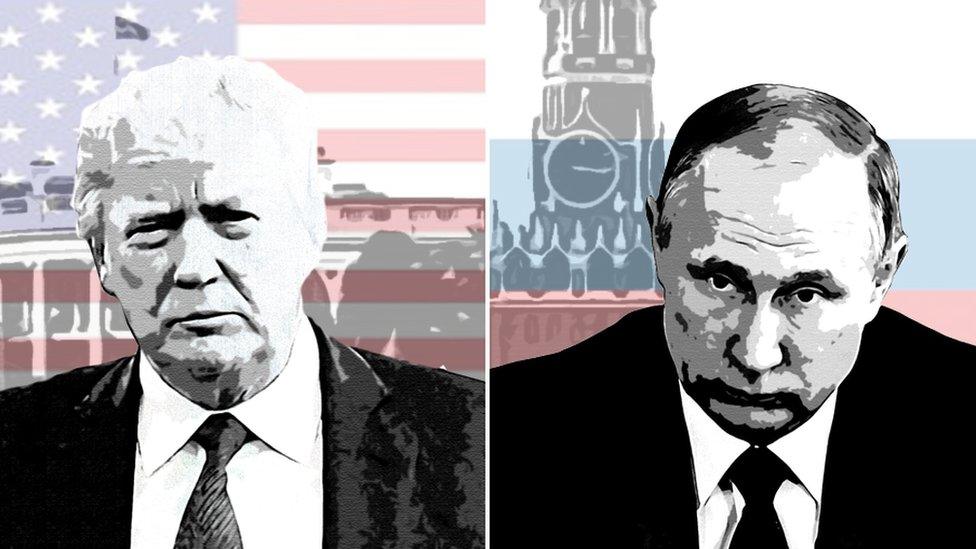Roger Stone: Trump ally, political strategist, Nixon fan and Russia probe defendant
- Published
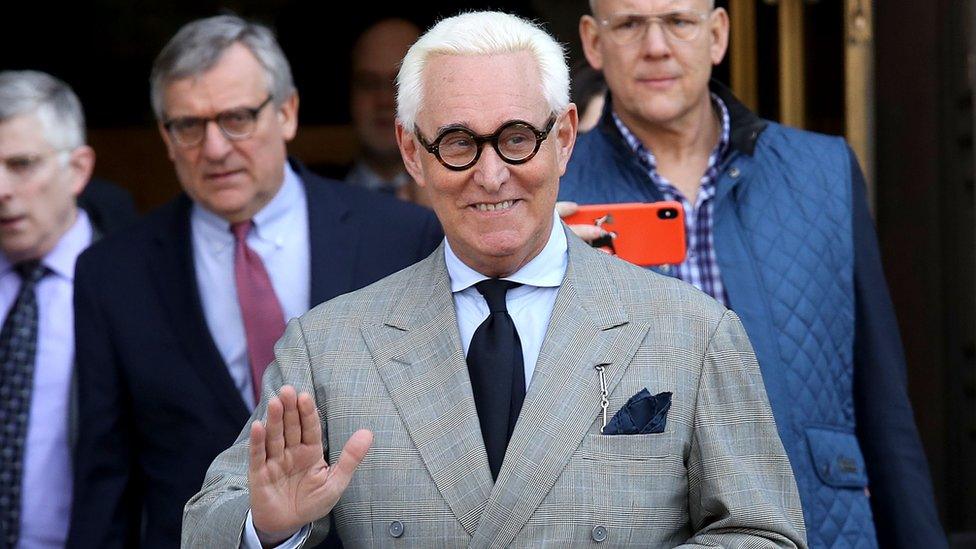
According to a Netflix documentary about his political career, Roger Stone convinced Donald Trump to run for president
Roger Stone is a long-time political strategist and former ally of President Donald Trump who was convicted on charges including lying to Congress but was later pardoned by Mr Trump.
Mr Stone was given a 40-month jail sentence in February 2020 after a trial in Washington DC.
However, he never served jail time as Mr Trump commuted his sentence in July, days before he was due to report to a federal prison. He was then pardoned in the last weeks of Mr Trump's presidency.
Mr Stone was arrested in January 2019 in connection with Special Counsel Robert Mueller's probe into alleged collusion between Russia and the Trump campaign.
A political veteran, Mr Stone has worked with Republicans since the 1970s and even bears a tattoo of Richard Nixon on his back.
But who is the self-described "dirty trickster" and why was he put on trial?
Trial and conviction
Roger Stone was found guilty of seven criminal counts of lying to the House of Representatives' Intelligence Committee, obstructing justice and witness tampering.
His conviction is connected to statements he made about the Trump campaign's efforts to obtain emails hacked by Russia to undermine Hillary Clinton's presidential campaign.
These emails were published by WikiLeaks.
Some of the lies were about the existence of certain emails and texts. Others related to Mr Stone's conversations with Trump campaign officials and a reported "intermediary" with WikiLeaks in early 2016.
Prosecutors said he lied about the date of those conversations, and the identity of the intermediary.
Mr Stone was also convicted of tampering with a witness - comedian Randy Credico, whom Mr Stone told Congress was the WikiLeaks back channel - when they were called to testify before Congress and speak with the FBI.
In messages Mr Stone sent to Mr Credico, he told him to "prepare to die", and called him "a rat". Mr Stone also told him: "Stonewall it. Plead the Fifth. Anything to save the plan."
Both Mr Stone and Mr Credico have since said that Mr Credico was not the WikiLeaks intermediary.
During the trial, prosecutor Aaron Zelinsky told the jury that Stone - whose activities had long been scrutinised by both the FBI and the Senate - lied "because the truth looked bad for the Trump campaign".
Mr Stone denied the charges, but was convicted on 15 November 2019.
Sentencing him on 20 February, Judge Amy Berman Jackson said Mr Stone had engaged in "intolerable" "threatening and intimidating conduct" toward her.
In addition to the jail sentence, Mr Stone had been due to serve two years' probation after his custodial sentence. He was also fined $20,000 (£15,500).
Who is Roger Stone?
Born in Connecticut in 1952, Mr Stone first got involved in politics at the age of eight, agitating for Democratic candidate John F Kennedy.
"I remember going through the cafeteria line and telling every kid that Nixon was in favour of school on Saturdays," the strategist told the Washington Post in a 2007 interview, external. "It was my first political trick."
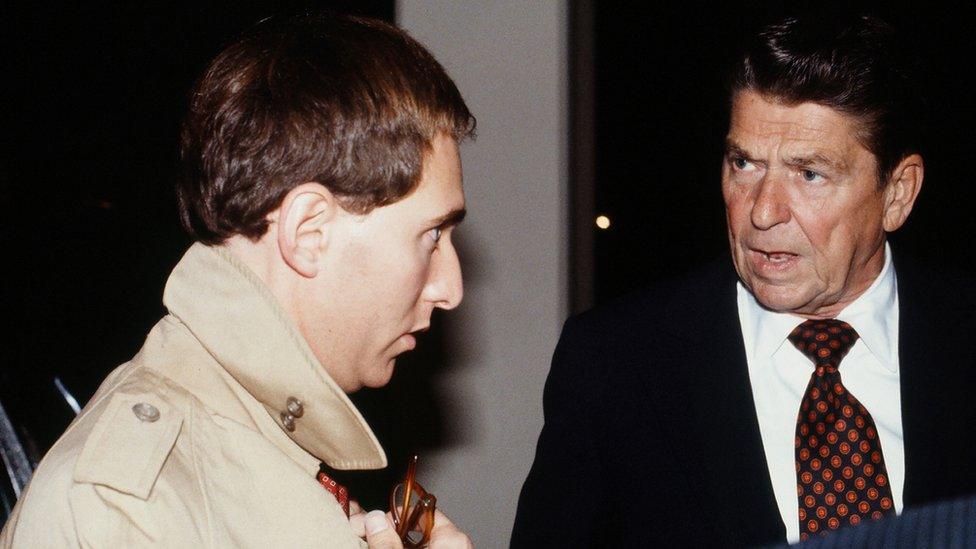
Roger Stone, seen here with Ronald Reagan, has worked on Republican political campaigns since the 1970s
But Mr Stone would begin his professional career helping out on Richard Nixon's 1972 re-election campaign.
Congressional hearings in 1973 called to investigate the Watergate scandal reportedly revealed Mr Stone had hired a Republican operative to infiltrate Democratic candidate George McGovern's campaign, and sabotaged a Republican challenger to Nixon.
The revelations cost him his job for then-Senator Bob Dole, but Mr Stone insists he did not break any law.
"The reason I'm a Nixonite is because of his indestructibility and resilience," he told the New Yorker in an interview, external, shortly after he had the 37th president's face tattooed between his shoulder blades.
"Women love it," he said.
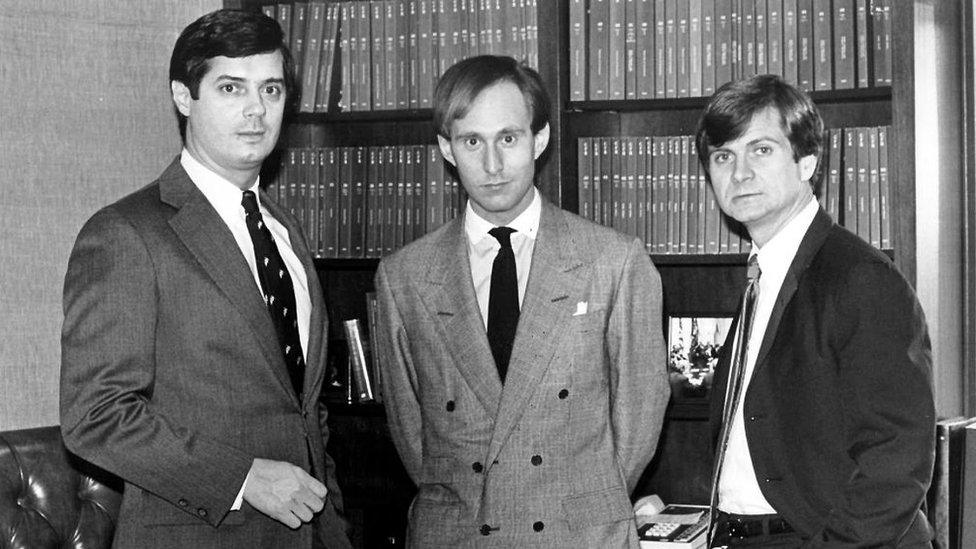
Roger Stone, centre, pictured in 1985 with Paul Manafort, left, and Lee Atwater
Stone went on to work on Ronald Reagan's successful presidential runs in 1980 and 1984, and aided George HW Bush's election in 1988.
But Richard Nixon still seems to hold special significance for Mr Stone - aside from the tattoo, he has a room of Nixon memorabilia in his office in Oakland Park, Florida.
How does he know Donald Trump?
In the 1990s, Mr Stone worked as a lobbyist for Donald Trump's casino business, and later helped Mr Trump's unsuccessful White House run in 2000.
According to the Netflix documentary Get Me Roger Stone, the strategist reportedly encouraged Mr Trump to run for the presidency, external.
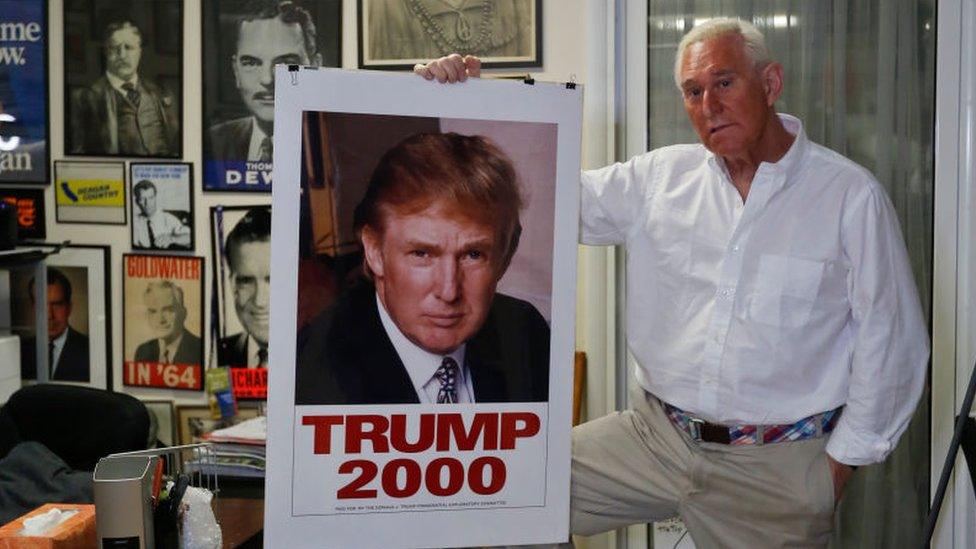
Stone helped Donald Trump in his failed bid for the presidency in 2000
While serving on Mr Trump's campaign in 2015 the pair allegedly had a falling out - Mr Stone says he quit, while Mr Trump said he had fired the operative.
But days later Mr Stone wrote a piece for Business Insider, external in support of the Republican candidate, titled "The man who just resigned from Donald Trump's campaign explains how Trump can still win".
Since Mr Trump's election, the president distanced himself from Mr Stone, external. This, despite Mr Stone regularly appearing on television to defend his former employer.
His Twitter account was temporarily suspended in 2017 after the strategist attacked journalists on the site, allegedly using homophobic language to target CNN presenter Don Lemon.
Mr Stone threatened to sue the platform, saying he had been "inundated on Twitter with bloggers threatening to kill me... yet Twitter seems unconcerned about that".
Trump says what people think, says strategist Roger Stone
The political veteran's dress code has also garnered attention. He reportedly does not wear socks, and favours custom-made suits.
"If life is a stage, then you should always be in costume," he told the New York Times in 2015, external. "And if you are trying to connote a certain authority in your business life, I think being well dressed is part of that."
- Published24 July 2019
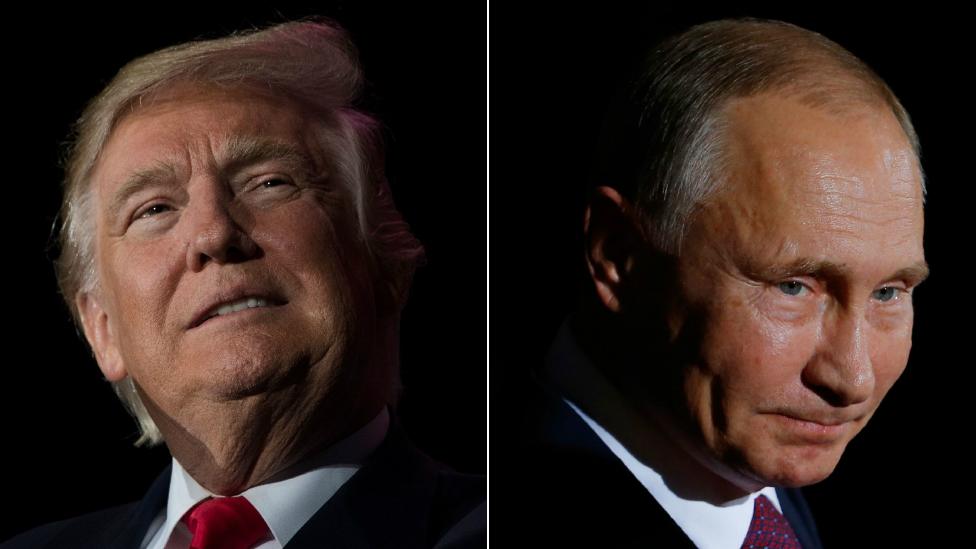
- Published25 March 2019
